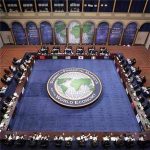 For the past couple years we have been covering every nuance of the economic collapse and in almost every instance we have come to the conclusion that 2010 would be the year that the U.S. would see an incredible downturn, possibly resulting in the inflationary disintegration of the Dollar, and a major stock market revolt which would destroy any remaining illusion Americans still have that a recovery is in progress:
For the past couple years we have been covering every nuance of the economic collapse and in almost every instance we have come to the conclusion that 2010 would be the year that the U.S. would see an incredible downturn, possibly resulting in the inflationary disintegration of the Dollar, and a major stock market revolt which would destroy any remaining illusion Americans still have that a recovery is in progress:
http://neithercorp.us/npress/?p=74
http://neithercorp.us/npress/?p=167
We are now on the edge of winter 2009, and recent events across the globe indicate more and more that our predictions for 2010 were correct. Let’s examine some of those events and their implications now…
Dubai: Why Should We Care?
Only a year ago, Dubai was the jewel of the Middle East. A financial Mecca centered in the midst of the United Arab Emirates, Dubai has been nicknamed the “Global City,” not necessarily because its population is “globally conscious,” but because without investment from numerous foreign nations, Dubai would not exist.
Dubai is often mistaken as an oil rich nation, but the fact is, only 6% of Dubai’s GDP is supported by oil revenue. The vast remaining portion of Dubai’s economy operates completely on money from the U.S., China, Europe, and other foreign interests.
Since the “Great Recession” began in 2007, rumors of a systematic financial collapse in Dubai have circulated, along with reports of frozen investment, and even abandoned Real Estate projects that have left the country looking like a ghost town. In the past week, those rumors have been officially confirmed:
Essentially, Dubai is bankrupt, and this news has sent a shockwave through markets around the world. But why? Why would Dubai’s bankruptcy affect U.S. markets?
The first thing that we must understand is that this is the result of living in a “globalized” economy. Instead of having sovereign and self sufficient financial systems that act as checks to total world collapse, we now have “interdependent” economies connected like a chain of dominoes. All it takes is for one to tip over, and the others follow suit.
If a once explosive economy like that of Dubai’s is now on the edge of insolvency, this means Western companies are incredibly weak and unable to invest any longer. Dubai’s collapse indicates that the capital that once flowed from rich nations like the U.S. has dried up. The world is reeling, and perhaps even broke. Dubai is the canary in the coal mine, and the canary has just dropped dead. The signal is clear; the astounding resurgence of world markets is an illusion built on nothing but fantasy and fiat money printed out of thin air and used to prop up the Dow. Dubai has kicked off the coming avalanche, but there is more…
Chinese Banks Frantically Try To Raise Capital?
A recent event that has gone almost completely ignored by MSM economists was the announcement that Chinese banks are now under government pressure to shore up their finances, and are set to unleash a wave of billions of dollars in capital raising that could strain equity markets. The Chinese government seems to be very concerned about the financial cushion available to the country’s banks:
http://www.reuters.com/article/ousiv/idUSTRE5AN4XD20091124?pageNumber=2&virtualBrandChannel=11617
Over the next year or more, Chinese financial institutions will be pulling billions of Yuan out of various investments, selling stocks and bonds in order to raise a massive amount of capital, but for what?
The move appears quite sudden, as if the push for capital is meant as a hedge for a possible panic event, much like an inside trader selling off his shares in a company because he knows it is about to go bust. Either these banks are much weaker than the Chinese government has let on in its economic reports, or, they are expecting a severe downturn in the markets, which would explain why they need billions of Yuan as a parachute. Either way, as soon as the Chinese begin pulling capital out of U.S. markets (in which they are heavily invested) we can expect to see the DOW falter drastically.
The shoring up of billions of Yuan could also indicate that the Chinese are preparing to dump more U.S. treasuries, as they did a couple of months ago:
http://blogs.reuters.com/great-debate/2009/08/20/china-cuts-treasury-holding-to-fund-foreign-deals/
The dollar has been dropping steadily and hard, and eventually, China and other nations with large dollar holdings will attempt to move out of U.S. treasuries. A 300 billion Yuan capital pool may be intended as a hedge to protect against a U.S. dollar collapse, allowing China to eventually dump their T-bonds without completely destroying their own savings in the process.
We also reported recently on China’s move to bring the ASEAN economic block to fruition, along with the announcement that ASEAN and all countries involved may take on the Yen as their “reserve currency:”
http://neithercorp.us/npress/?p=179
This new trade agreement along with an internationally traded Yen would put China in a prime position to drop its reliance on the U.S. and the Dollar. All signs indicate a move toward separation from the traditional economic agreement between China and the U.S. will occur in 2010.
Trouble Brewing In Japan
The MSM has been relatively quiet on Japan’s current financial condition, perhaps because its condition is growing increasingly worse, and this reflects poorly on the condition of the U.S. Dollar.
Japan is another Asian country that once relied heavily of American consumption as a support mechanism for its economy. This mechanism has survived due to the Yen’s relative weakness to the Greenback, allowing for a profitable trade deficit in Japan’s favor. However, Japanese exports have taken a tremendous hit due to the Dollar’s steady decline, falling between 20% and 30% every month for the past year:
http://www.nytimes.com/2008/11/20/business/worldbusiness/20iht-20yen.17980660.html?_r=1
This major decline in exports (Japan’s bread and butter) has caused a deflationary trend in Japanese markets, as well as sending the middle class there into a mode of savings and self protection. Japanese companies have attempted to stall job-loss in the country by cutting the pay of their employees, instead of issuing pink slips. This has resulted however in many families being “equally” on the edge of poverty:
In August 2009, elections placed the Democratic Party of Japan (DPJ) in power, a regime change that has not occurred since 1955. The new Prime Minister of Japan, Yukio Hatoyama, has announced publicly and often that he would like Japan to break from its reliance on the American economy and form more tightly with the ASEAN trading bloc:
http://www.scribd.com/doc/21587303/My-Political-Phylosophy-Essay-of-Yukio-Hatoyama
For now, Hatoyama feels that this move would take some time, and that America’s economic dominance will be weakened but sustained. However, if Japan’s deflationary spiral continues at its current pace due to a weak dollar, a dollar being slowly destroyed by the private Federal Reserve, he may change his mind about a timetable for joining ASEAN and breaking from the U.S.
Japan holds a substantial amount of U.S Treasury debt, meaning just like in the case of China, if these treasuries are dumped, our currency will implode.
Gold Buying Bonanza By Foreign Central Banks
We have reported for a long time on China’s quiet gold buying habits which have increased it reserves by 75% or more since 2003:
http://www.financialpost.com/news-sectors/story.html?id=1530063
These reserves have probably been expanded much more in the past few months, and China has indicated a desire to increase its gold holdings from 1600 tons to 6000 tons in the next few years!
http://finance.yahoo.com/tech-ticker/article/382000/Rosenberg-Gold-Going-to-2600-Thanks-to-China?tickers=GLD,GDX,%5EHUI,ABX,NEM,GOLD,FCX
But even bigger news is the announcement that India has bought 200 tons of gold from the IMF and may buy 200 more:
The IMF originally offered up the 400 ton gold sale in the midst of one of the biggest gold rallies in recent history, obviously as an attempt to flood the market and manipulate the price down. The attempt failed, and gold has surged to nearly $1200 an ounce in the past couple months.
Russia has also been stocking gold, buying 15.6 tons in October and bringing their reserves to approximately 606 tons. Not only this, but Russia has also announced its intentions to diversify into other national currencies and away from the dollar. Even the Chinese Yuan may be included in Russia’s forex:
http://in.reuters.com/article/fundsNews/idINGEE5AM1A020091123
http://english.people.com.cn/90001/90778/90859/6792509.html
Numerous nations are obviously moving to protect themselves. Right now, gold is the only currency alternative to the dollar that is accepted everywhere (until the SDR gets rolling). Gold buying indicates that these countries fully expect market turmoil and dollar weakness to continue and perhaps escalate.
Bad Signs On The Homefront
The situation in American employment, credit, currency, and real estate has only become worse since the federal stimulus plan was instituted. “Official” unemployment has soared to 10.2% while REAL unemployment according to the U-6 measurement is around 18%.
Real Estate continues to be incredibly weak, and mortgage payment delinquencies and bankruptcy have grown unabated:
http://www.consumeraffairs.com/news04/2009/11/mortgage_delinquencies.html
Over 125 banks across the country have been closed in 2009. You can see the FDIC’s closed bank list here:
http://www.fdic.gov/bank/individual/failed/banklist.html
The FDIC has announced that it has officially run out of funds, and is now in the red for $8.2 billion (that they admit to, the real amount could be much more). The FDIC is now pulling funds directly from the Treasury to cover future bank losses. This puts even more of a strain on the already crumbling dollar:
http://investment-blog.net/alert-fdic-is-broke-82b/
American’s buying habits are perhaps the biggest indicator that something is very wrong. Polls indicate the 93% of U.S. consumers will most likely spend much less this Christmas season then they did the last, and many of them will not be using credit cards:
http://news.yahoo.com/s/ap/us_ap_poll_stressing_over_debt
The U.S. economy has been fueled by easy credit for decades. The fact that Americans have dumped credit in favor of cash means they will be spending FAR less this holiday season than any MSM economist wants to admit to. I believe the seasonal retail numbers for 2009 will be startling to many who are not aware of the true condition of the economy, and who have blindly believed the Federal Reserve’s announcements that the recession is “over.”
We have predicted for at least the past two years that the primary collapse of the U.S. economy would occur in 2010. We stand by that prediction. Our hopes remain that this prediction will be proven incorrect, and that all will be well, however we have no illusions according to the current data that this will be so. Neither Corporation encourages all of our readers to examine the conditions and information for themselves, and we request that all those who find our conclusions to be correct should make preparations to protect your savings and the well being of your families.
A climactic economic event is on the horizon, and the train is already in motion. We may not be able stop the event from taking shape, but together we can determine its outcome. All those who value truth, liberty, and an honorable society, should be ready not only to save themselves, but to save each other, and to save their country. The time for readiness grows short.
Giordano Bruno
sursa: infowars.com












Adauga comentariu